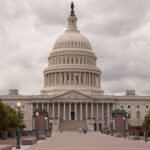


Could the U.S. soon be boots on the ground in Nigeria to stop what some call a modern-day genocide?
President Trump has flagged Nigeria as a country of particular concern due to relentless violence against Christians by Islamist militants like Boko Haram, ordering the Pentagon to gear up for possible military intervention while tasking Republican Rep. Riley Moore of West Virginia and Chairman Tom Cole of Oklahoma to investigate the crisis with potential responses ranging from sanctions to strikes.
For over a decade, Nigeria’s northern Christians have endured horrific attacks from Boko Haram, a terrorist group infamous for burning churches, conducting night raids, and even kidnapping hundreds of schoolgirls, as seen in the 2014 Chibok abduction of 276 teens, many of whom were enslaved.
Reports from groups like the International Society for Civil Liberties and Rule of Law paint a grim picture: between 2009 and 2023, at least 52,000 Christians were killed, 18,500 abducted with little hope of survival, and 20,000 churches or Christian schools attacked.
Boko Haram’s brutality knows no bounds, arming children as suicide bombers and running slave markets in areas they control, while the Nigerian government—despite receiving billions in U.S. security aid since 2009—seems to shrug off the crisis.
“They’re not taking this seriously,” said Rep. Moore, pointing to a chilling incident where a pastor’s warning of an imminent attack was dismissed as “fake news,” only for that pastor and 20 congregants to be murdered within 24 hours.
Washington has pumped roughly $600 million in counterterrorism aid into Nigeria over the past decade, mostly targeting the northeast, yet Rep. Moore questions the Nigerian government’s priorities, suggesting they’ve failed to make protecting Christians a focus.
Moore and Cole are digging deep, consulting NGOs and Christian groups on the ground to document the violence, which Moore claims sees Christians killed at a staggering five-to-one ratio compared to non-Christians.
The duo plans to meet Nigerian officials in Washington this month and may send delegations to Nigeria, though Moore insists the U.S. could still partner with Nigeria’s government if it shows genuine resolve to tackle extremist groups.
Nigeria, with over 230 million people and more than 500 languages, is a nation of deep divisions, where Muslims dominate the north and Christians the south, a split tracing back to 19th-century missionary roots from freed slaves returning as educators.
Despite vast oil and mineral wealth, including lithium and cobalt that have caught U.S. attention amid competition with China, corruption and mismanagement have left many Nigerians in poverty, while insecurity in mining regions threatens Western investment.
The Nigerian government, however, pushes back hard against claims of targeted violence, arguing that terrorists strike indiscriminately across faiths, a stance that clashes with the firsthand accounts Moore’s team is gathering.
A direct U.S. military campaign in Nigeria seems unlikely, as a defense official notes the lack of permanent U.S. bases there, with only small teams of advisors and trainers working under U.S. Africa Command programs.
Still, Moore isn’t ruling out force, stating, “All options are on the table here for this, even kinetic military action,” suggesting targeted strikes on militant leaders could be a last resort if the killing doesn’t stop.



